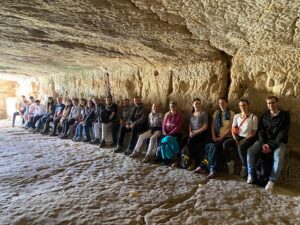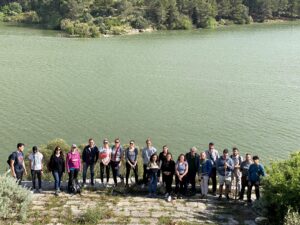Environmental Students from the Institute of Applied Sciences, MCAST were accompanied by Dr Eman Calleja and Mr Edward Falzon on a two-day training program on Bioengineering techniques in Sicily between the 17 and 18 April.
The trip was organised by Dr Eman Calleja and financially supported by the Erasmus office within MCAST. During the trip, the students were taken to see various environmental projects in the province of Ragusa that included a slope stabilisation project in the archaeological park of Ispica and various other green infrastructure in the commune of Modica.

The 10 students from the BSc (Hons) Degree in Environmental Sciences and Sustainable Technologies were exposed to innovative techniques that are not currently in use in Malta. The host, Engineer Gianluigi Pirrera of Biocity Engineering, explained that the challenges met in Sicily and Malta are similar in terms of land use conflicts and intersectoral conflicts that make the use of Bioengineering techniques particularly effective at finding environmentally friendly and economical solutions to problems in major infrastructural projects. One particularly interesting project was the use of vegetation and geotextile mesh to cover the 50km long pipeline that runs from Lake Rosalia to Ragusa, Modica and Scicli. The 1m wide pipeline was laid above ground but covered with vegetation at a fraction of the cost with minimal visual impact and minimal cost compared to having used traditional engineering techniques that use concrete and steel.
The group from MCAST were also accompanied by a group of 6 Austrian specialists in green infrastructure from the University of BOKU Vienna, with their team leader being Professor Rosemarie Stangl, a renowned environmental engineer and general manager of the European Federation of Soil Bioengineering.

The Institute of Applied Sciences in MCAST offers a 3-year Bachelor of Sciences Degree in Environmental Sciences and Sustainable Technologies. The program offers a practical approach at teaching sustainable technologies and involves a one month work placement with the environmental sector, as well as organises regular visits abroad to expose the students to the environmental challenges and solutions met in other countries.







 MCAST Main Campus
MCAST Main Campus  +356 2398 7100
+356 2398 7100
 information@mcast.edu.mt
information@mcast.edu.mt